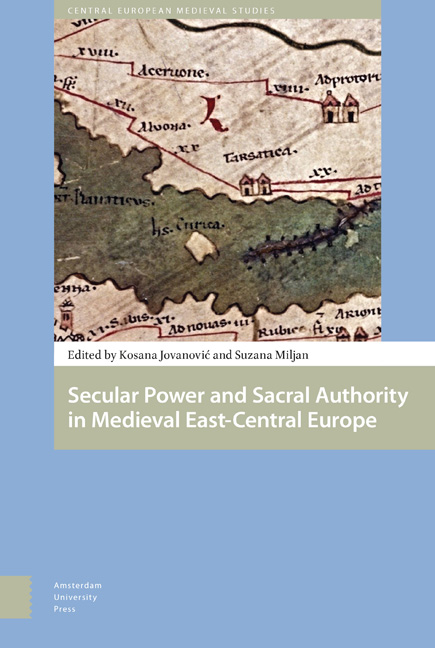Book contents
- Frontmatter
- Contents
- List of Figures and Tables
- Acknowledgements
- Foreword
- Folklore of the Medieval Kings of Hungary: Preliminary Research Report
- Variations on Nobility in Central and South-Eastern Europe: An Introduction
- The Changes of Office of Ban of Slavonia after the Mongol Invasion in Hungary (1242-1267)
- The Reconstruction and Role of Roads in the Formation of a Medieval Cultural Landscape: The Example of Episcopal Estates of Dubrava, Ivanić and Čazma
- From Castle-Warrior to Nobleman: Case Study of a Family of Slavonian Lesser Nobility
- Late Medieval Village in Turopolje (Slavonia): The Example of Donja Lomnica
- Economic Development and Transformation of the Pauline Monasteries near Senj under the Frankapan Patronage
- The Society of the Noble Judges in Northeastern Hungary during the Reign of King Sigismund (1387-1437)
- Development of Ragusan Diplomatic Service in the First Half of the Fifteenth Century: Father and Son at the Court of Duke Sandalj Hranić
- Croatian Students at the University of Prague in the Fifteenth Century
- A Contribution to Medieval Croatian Diplomatics: Cyrillic Charters of Croatian Nobility from the Franciscan Monastery on Trsat in Rijeka
- Peter of Crkvica, a Man Who Could Be Trusted: The Career of a Middle-Ranking Cleric and Diplomat in the Kingdom of Hungary in Mid-Fifteenth Century
- The Nobility of the Despotate of Serbia between Ottoman Empire and Hungary (1457-1459)
- List of Contributors
- Index
Peter of Crkvica, a Man Who Could Be Trusted: The Career of a Middle-Ranking Cleric and Diplomat in the Kingdom of Hungary in Mid-Fifteenth Century
Published online by Cambridge University Press: 12 December 2020
- Frontmatter
- Contents
- List of Figures and Tables
- Acknowledgements
- Foreword
- Folklore of the Medieval Kings of Hungary: Preliminary Research Report
- Variations on Nobility in Central and South-Eastern Europe: An Introduction
- The Changes of Office of Ban of Slavonia after the Mongol Invasion in Hungary (1242-1267)
- The Reconstruction and Role of Roads in the Formation of a Medieval Cultural Landscape: The Example of Episcopal Estates of Dubrava, Ivanić and Čazma
- From Castle-Warrior to Nobleman: Case Study of a Family of Slavonian Lesser Nobility
- Late Medieval Village in Turopolje (Slavonia): The Example of Donja Lomnica
- Economic Development and Transformation of the Pauline Monasteries near Senj under the Frankapan Patronage
- The Society of the Noble Judges in Northeastern Hungary during the Reign of King Sigismund (1387-1437)
- Development of Ragusan Diplomatic Service in the First Half of the Fifteenth Century: Father and Son at the Court of Duke Sandalj Hranić
- Croatian Students at the University of Prague in the Fifteenth Century
- A Contribution to Medieval Croatian Diplomatics: Cyrillic Charters of Croatian Nobility from the Franciscan Monastery on Trsat in Rijeka
- Peter of Crkvica, a Man Who Could Be Trusted: The Career of a Middle-Ranking Cleric and Diplomat in the Kingdom of Hungary in Mid-Fifteenth Century
- The Nobility of the Despotate of Serbia between Ottoman Empire and Hungary (1457-1459)
- List of Contributors
- Index
Summary
Although the careers of high-ranking politicians and diplomats are usually objects of interest to historians, on account of their offering a compelling insight into the political events and processes of their times, we can also learn a lot from studying the careers of low- or middle-ranking ones. Those are the men who managed to climb up several rungs on the social ladder, sometimes even to considerable heights, but never high enough to shape political doctrines. Nevertheless, without them acting as go-betweens or factotum, the diplomatic and political machinery would not be able to function.
During the mid-1430s, one such person in the service of the Kingdom of Hungary was Peter of Crkvica. Although his moniker immediately reminds us of Cirkvena, Peter was not a member of this noble family of late medieval Slavonia; his place of origin can be identified as Crkvica (Cirkewcza), where in the fifteenth century stood a parish church dedicated to the Blessed Virgin. Its exact location has not been determined so far, but it was probably somewhere in the vicinity of the town of Križevci, in the territory of the late medieval Kingdom of Slavonia, a constituent part of the Kingdom of Hungary.
Peter of Crkvica enrolled in the University of Krakow in the summer semester of 1430, but probably did not attain any of the higher academic degrees. This was by no means unusual, considering that at that time most of the students would usually leave the university after graduating as bachelors of liberal arts, or even sooner. Although some of the documents style Peter as master, in those cases this title does not signify that he possessed the academic degree of master, but appears merely as an honorary usually used for the members of royal chanceries. In any case, in the supplications he addressed to the Pope, when asking to be awarded certain ecclesiastic benefices, Peter did not mention any academic degrees, which is an almost certain indication that he did not possess any. If he did, he would have certainly stated so, because candidates with higher education were generally favoured for such benefices, and they listed their titles scrupulously when applying for them.
Sometime before, or in 1445, Peter joined the entourage of John (János) Hunyadi, and managed to become his notary and chaplain. Notaries were low-ranking officials in medieval chanceries, and their tasks were not very glamorous.
- Type
- Chapter
- Information
- Publisher: Amsterdam University PressPrint publication year: 2018



